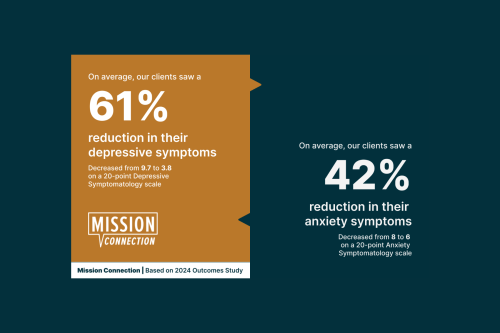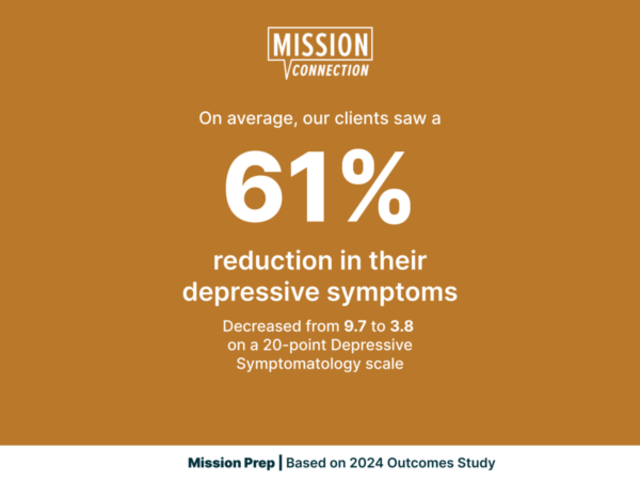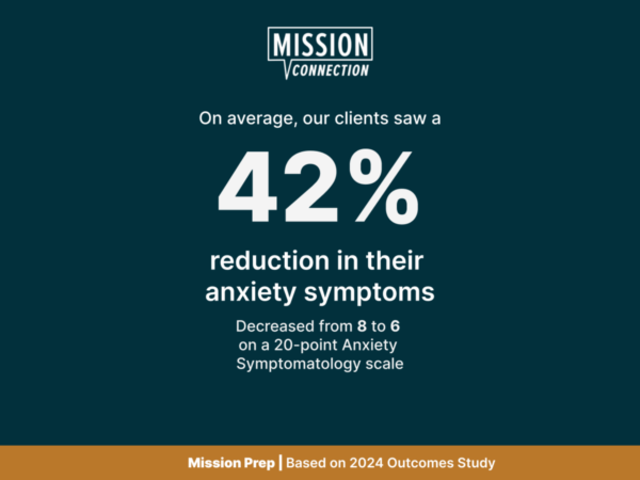








Mission Connection
Verified Center
This provider's information has been quality-checked by Recovery.com's Research Team for accuracy and completeness, including center verification through appropriate third-party organizations.
Treatment Focus
At this center, you receive personalized care for mental health conditions. They provide therapy and tailor treatment to your unique needs, diagnoses, and preferences.
Primary Level of Care
The delivery of therapeutic services utilizing technology such as video conferencing, online messaging or phone calls, allowing for flexibility, comfort and increased access to care
Treatment Focus
At this center, you receive personalized care for mental health conditions. They provide therapy and tailor treatment to your unique needs, diagnoses, and preferences.
Primary Level of Care
The delivery of therapeutic services utilizing technology such as video conferencing, online messaging or phone calls, allowing for flexibility, comfort and increased access to care
Provider's Policy
We recognize the importance of financial considerations in accessing adult therapy. Mission Connection works closely with top health insurance providers to facilitate access to quality mental healthcare for our clients and their families.
Mission Connection
Mission Connection
About Mission Connection
Mission Connection extends A Mission for Michael’s compassion-driven, evidence-based clinical program through an online platform and in-person outpatient care. Their Virginia telehealth and outpatient services provide access to mental health treatment. Mission Connection empowers clients to connect with their clinical team when, where, and how it’s most convenient for them.
Specialized Mental Health Treatment
Mission Connection uses comprehensive assessments to learn more about client’s symptoms, history, challenges, and strengths. With this understanding, they craft treatment plans that match their strengths and challenges. They treat primary and co-occurring:
- Depression
- Anxiety
- Trauma
- Bipolar Disorder
- Paranoia
- Panic Attacks
Evidence-Based Telehealth Care
Mission Connection’s multidisciplinary team delivers daily group therapy with licensed therapists, weekly psychiatric care, medication management, and weekly individual therapy. In individual therapy, they develop and implement a person-centered treatment plan tailored to meet client needs. The clinical team utilizes cognitive behavioral therapy (CBT), dialectical behavioral therapy (DBT), emotion-focused therapy (EFT), and solution brief focused therapy (SBFT). Clients also engage in life skills training and psychoeducation.
Flexible Virtual and In-Person Outpatient Care
Mission Connection provides mental health treatment that fits clients’ needs and schedules. Virtual telehealth allows clients to recover in the comfort of their homes, creating greater accessibility to care. For more intensive care, clients can choose their on-site outpatient program. The program meets multiple days weekly and can be tailored to specific recovery needs. Their compassionate clinical team walks with clients every step of the way, frequently collaborating to create individualized and up-to-date treatment.
Highlights from the Center
Highlights
These highlights are provided by and paid for by the center.
Wellness Emphasis
Mental Health Disorder Treatment
Tech Friendly
Trauma Treatment
Center Overview
Treatment Focus
At this center, you receive personalized care for mental health conditions. They provide therapy and tailor treatment to your unique needs, diagnoses, and preferences.
Joint Commission Accredited
The Joint Commission accreditation is a voluntary, objective process that evaluates and accredits healthcare organizations (like treatment centers) based on performance standards designed to improve quality and safety for patients. To be accredited means the treatment center has been found to meet the Commission's standards for quality and safety in patient care.

Mission Connection
Insurance Accepted




Our Centers
Recovery.com Verified Listing
Recovery.com verified that the name, location, contact information and license to operate for this treatment provider are valid and up-to-date.

Joint Commission Accredited

Licensed by Virginia
Recovery.com is an independent, third-party mental health resource. Verification does not imply endorsement and does not guarantee the quality of treatment services.
Meet Your Care Team

Ashley Pena
National Executive Director

Lisa Neumann
Director of Virtual Group Programing

Madelyn Lombardi
Clinical Coordinator, Teens

Jessica Garcia
Nurse

Taylor Spruce
Primary Therapist l

Blessing Dawson
Clinical Program Director
Your Care Options
Specializations
Anxiety
Anxiety is a common mental health condition that can include excessive worry, panic attacks, physical tension, and increased blood pressure.
Bipolar
This mental health condition is characterized by extreme mood swings between depression, mania, and remission.
Depression
Symptoms of depression may include fatigue, a sense of numbness, and loss of interest in activities. This condition can range from mild to severe.
Licensed Primary Mental Health
Some primary care providers offer mental health diagnosis and treatment. This can prevent patients from developing more serious conditions.
Outpatient
During outpatient rehab, patients attend a structured treatment program while continuing to live at home.
Suicidality
With suicidality, a person fantasizes about suicide, or makes a plan to carry it out. This is a serious mental health symptom.
Trauma
Some traumatic events are so disturbing that they cause long-term mental health problems. Those ongoing issues can also be referred to as "trauma."
Who We Treat
Men and Women
Men and women attend treatment for addiction in a co-ed setting, going to therapy groups together to share experiences, struggles, and successes.
Pregnant Women
Addiction and mental health treatment meets the clinical and psychological needs of pregnant women, ensuring they receive optimal care in all areas.
Treatment Services
Licensed Primary Mental Health
Some primary care providers offer mental health diagnosis and treatment. This can prevent patients from developing more serious conditions.
Private Therapy
This is an individual therapy that's often available at private therapy clinics. Clients may be able to choose a therapist who best fits their unique needs.
Outpatient
During outpatient rehab, patients attend a structured treatment program while continuing to live at home.
Approaches
Evidence-Based
A combination of scientifically rooted therapies and treatments make up evidence-based care, defined by their measured and proven results.
Holistic
A non-medicinal, wellness-focused approach that aims to align the mind, body, and spirit for deep and lasting healing.
Personalized Treatment
The specific needs, histories, and conditions of individual patients receive personalized, highly relevant care throughout their recovery journey.
Therapies
1-on-1 Counseling
Patient and therapist meet 1-on-1 to work through difficult emotions and behavioral challenges in a personal, private setting.
Trauma-Specific Therapy
This form of talk therapy addresses any childhood trauma at the root of a patient's current diagnosis.
Online Therapy
Patients can connect with a therapist via videochat, messaging, email, or phone. Remote therapy makes treatment more accessible.
Mindfulness Therapy
This ancient practice can be mental, emotional, and even spiritual. In meditation, you focus your attention on the present moment without judgement.
Expressive Arts
Creative processes like art, writing, or dance use inner creative desires to help boost confidence, emotional growth, and initiate change.
Eye Movement Therapy (EMDR)
Lateral, guided eye movements help reduce the emotional reactions of retelling and reprocessing trauma, allowing intense feelings to dissipate.
Psychoeducation
This method combines treatment with education, teaching patients about different paths toward recovery. This empowers them to make more effective decisions.
Solution Focused, Goal-Oriented Therapy
A quick goal-oriented therapy that helps patients identify their current and future goals, find out how to achieve them, and empower future problem-solving.
Conditions We Treat
Anxiety
Anxiety is a common mental health condition that can include excessive worry, panic attacks, physical tension, and increased blood pressure.
Bipolar
This mental health condition is characterized by extreme mood swings between depression, mania, and remission.
Depression
Symptoms of depression may include fatigue, a sense of numbness, and loss of interest in activities. This condition can range from mild to severe.
Obsessive Compulsive Disorder (OCD)
OCD is characterized by intrusive and distressing thoughts that drive repetitive behaviors. This pattern disrupts daily life and relationships.
Post Traumatic Stress Disorder
PTSD is a long-term mental health issue caused by a disturbing event or events. Symptoms include anxiety, dissociation, flashbacks, and intrusive thoughts.
Trauma
Some traumatic events are so disturbing that they cause long-term mental health problems. Those ongoing issues can also be referred to as "trauma."
Languages

Learn More About the Center
CBT
Learn more about CBT principles and how they’re useful in therapy.
Trauma Treatment
Read how Mission Connection treats trauma and PTSD.
Online Talk Therapy
Learn more about their virtual outpatient therapy services.
Trauma Therapy
Discover how trauma-informed therapies compassionately address trauma.





